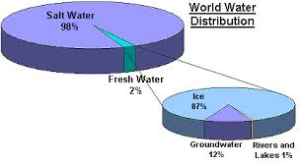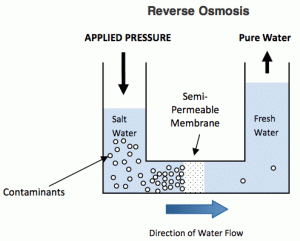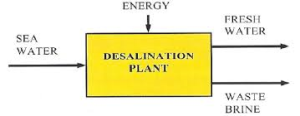Let us start with some numbers. Water covers 71 percent of Earth’s surface, comprises 60 percent of our bodies, only approximately .024 percent of Earth’s freshwater is readily available to us, the other 97 percent is salty ocean water, and the remaining water is in the form of glaciers, etc.. Water is an economic, social, national and global security, and an environmental issue. Water is all around us and is necessary for many forms of life, more importantly- there is no substitute for it.
Besides playing a major role in our bodies, water also supports life on earth, provides water for the crops and marine organisms that feed us, help carve out earth’s landscape which adds aesthetic value that we enjoy, water controls and moderates earth’s climate, as well as removes and dilutes some wastes we produce. Yet despite all these good services water provides us with we still do not ensure that we protect it. Specifically in the United States, the biggest user of water, we unnecessarily waste a lot of water while too many other people do not have access to freshwater and while nearly 1.6 million people die annually from waterborne illnesses that could have been prevented. That is disgusting and once you become aware of the facts continuing to waste and degrade our water resources seems unethical. Personally after using the “water footprint calculator” I found out that mine amounts to 981 cubic meters per year. Most of it comes from food and household usage. Most of the water use for food comes from being an average meat eater. Although I eat way less meat than what people consider average for an American, so maybe it is not exactly 981, but we can call that a pretty accurate ball park figure.
Experts say that many parts of the world will soon lose access to freshwater. So what are our options, how do we combat this? One question that I initially proposed while reading this week is: can we process ocean water to make it drinkable? And we actually can through a process called desalination. For those who wish for a return to the older days where we were less industrialized, desalination is actually quite a romantic remediation method dating back to 4 BC. There are two main methods for desalinating water: reverse osmosis and condensation. What I would suggest is that we used desalinated water to water crops in arid areas, cool power plants, water lawns, use in toilets, and for livestock. This way we could save freshwater mostly for just human consumption. I know this might sound like a planetary management approach, but people probably feel a lot better drinking plain freshwater as opposed to processed ocean water, people already complain about tap water for goodness sake. However desalinating salt water is costly, energy consuming, and produces briny wastewater that has to eventually go somewhere. Advancements in technology are showing potential ways of making it cheaper and more energy efficient to convert salty sea water so all hope is not lost.
The reality is that we have enough freshwater at the moment but it is unevenly distributed and it will not last forever. Places with higher populations do not have enough access to freshwater and on the other hand- places with high access to freshwater do not have a large population. Also, we grow our crops in places that yes have the amount of space we need but does not have the adequate water supply. As a result we pump water from faraway places to support these crops and this costs a lot of money, uses a lot of energy, and wastes a significant amount of water. I would suggest that we designate certain areas of the U.S for the cultivation of certain crops. Water thirsty crops should be grown in environments that receive ample rainfall or can be easily irrigated. And crops that do not need as much water should be grown in arid areas. The decision to grow crops in a certain area should not only depend on climate and space, but on water supply too.
While we are talking about water, we should mention the major threat of water pollution. Because who really cares about how much water we have to drink if it is all contaminated and making us sick? Agricultural activities, industrial facilities, mining, and the use of materials such as plastic are leading causes of water pollution in that order. A major result of water pollution is the infectious diseases that man and other life forms suffer and sometimes die from as a result of drinking water contaminated with human and animal wastes. There are certain bodies of water that we must be more watchful of than others- although they are all majorly important. Streams for example can cleanse themselves as long as we do not overload them with pollutants, redirect their waters, or reduce their flows. Bodies of water such as lakes and reservoirs are relatively stagnant and therefore are less effective at diluting pollutants. It takes a lake or a reservoir 1 to 100 years to do the amount of dilution that a stream could in several days to several weeks.
In short, it is important for us to get creative in our solutions. As far as desalination goes, there have been some great proposals one of which include using solar power to provide the energy required for a method such as reverse osmosis. The idea to use boats with their own desalination technology is another good idea. A radical addition to this idea would be to maybe actually create a type of gym where people could come and exercise on an elliptical or a cycle and charge a battery of sorts. Desalination companies could offer to buy these batteries especially in less developed countries or countries with high obesity rates, or countries with both! The money could help stimulate the economy, the exercise would increase the health of the population therefore stimulating the economy, and it would provide clean drinking water which I am sure would also stimulate the economy. We need take the time to prevent certain mishaps with our water supply, because the one thing we should all be clear on by now is that: prevention is always less costly, and more environmentally feasible, than remediation.



